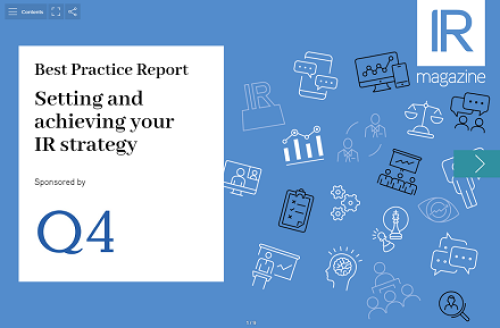Two experts reveal their ten tips for reaching out to retail investors
In an age of diversifying holdings and close-run proxy fights, retail investors can be invaluable to the makeup of any company’s ownership.
Whether they are broker-led, smaller investors or high-net-worth individuals, reaching out to prospective retail customers requires a slightly different tack from regular IR. Henri Perron, president of IR consultancy Renmark Financial Communications, and Andrea Wentscher, IR manager for retail investors at German chemicals firm BASF, reveal the 10 best steps IROs can take to build a retail investor strategy.
1. Don’t be afraid to put in the time and effort
‘The reason most IROs don’t deal with retail is because they don’t know where to start ‒ and they don’t know where it ends,’ says Perron. ‘It’s easier to focus on and cater for institutions rather than retail investors; that’s why everyone tells you that’s where to focus. Retail investors are equally important and should be addressed equally.’
Wentscher echoes the sentiment, particularly as 25 percent of BASF’s shares are now owned by retail investors. ‘This target group was always very important to BASF as it builds a stable and reliable base,’ she explains.
2. Consider dedicating a team member to retail
Individual investors became so important to BASF that in 2008 the company added a dedicated retail investor representative to its IR team. ‘Besides this special target group, the retail investor person is also responsible for online communications and social media, which – from our point of view – fits together perfectly,’ Wentscher explains. It also means retail investors have a regular point of contact and can reach out to BASF should they need to.
3. Lean on retail brokers
Brokers are vital to keeping in touch with a retail investor constituency, says Perron, though it’s no easy task. ‘If you want to reach out to retail brokers, you have to call thousands of them on the phone to find which ones invest in the sector you’re in, which ones have an interest, which ones like your management and where your company is headed. I call it grunt work,’ he explains.
‘A challenge today is that there are brokers that aren’t equity buying, but are managers of passive money. It’s important to identify those that are picking and buying stock. It’s also about educating brokers on the company so they can take that information to their clients and pass the information on. It takes a lot of time, though.’
4. Broker access goes both ways
Perron says that, in the first instance, some banks may be unwilling to let you speak to their brokers. ‘But some service providers have their own databases of individuals, which allow you to target those who might be interested,’ he notes.
Also important is to get retail brokers in front of your company’s management, which is do-able in short time. ‘For example, you can get a lot of brokers to attend a single presentation: one meeting of really interesting brokers,’ says Perron. ‘It’s a great use of C-suite time, and executives can spend the rest of the day marketing to institutions.’
5. Attend the right events
Wentscher says the team at BASF attends 10 special retail investor events a year, normally organized by Germany’s two main retail investor associations or directly by banks. ‘They invite their customers to listen to two or three IR presentations,’ she explains. ‘Afterwards the audience has the opportunity to ask questions. We found this a very good format for getting in touch with this target group and getting its valuable feedback.’
6. Personal relationships matter
As always, making contact frequently and personally means your link to brokers or high-net-worth investors is ever-strengthened. ‘We still contact brokers by phone every day – emails can be ignored. You have to make contact and build relationships,’ advises Perron. ‘In the retail world the art of the relationship is still there and is vital to connecting with these investors.’
7. Tailor content for retail investors
Whether it’s presentations, press releases or just company updates, retail investors often require different information from their institutional counterparts. ‘It’s a difficult task but a good one,’ says Wentscher, talking about diversifying your shareholding. ‘We can recommend presentations dedicated to retail investors to address their needs and answer their questions directly.’
8. Leverage your IR website…
Wentscher also recommends making your IR website the first port of call for retail investors. ‘We can ensure the information there is available for everybody, 24 hours a day,’ she explains. ‘On the website we have common features like the newsletter, share monitor, interactive analyst, presentations, webcasts, and so on. In addition to that we started our social media activities with a dedicated IR Twitter account in 2009.’
9. …but beware of social media
Social media is not without its risks, however, and retail investors are more likely than others to be swayed by what they read online or to contribute to it. ‘You always have to ask the questions: who’s on there? Who’s going to be writing about my company? How reliable is information going to be on there?’ says Perron. ‘It’s unregulated, and anyone can write anything about anybody.’
10. Don’t expect instant returns
Overhauling your share ownership is not a simple task and definitely can’t be achieved quickly, especially if it involves changing the way in which an IR team works. In fact, says Perron, it might require a significant change to how you conduct your entire IR program. ‘Many IROs view it as a sprint, when they should be looking at it as a marathon,’ he continues. ‘It’s not something you should do sporadically, but consistently – just like your institutional marketing.’










